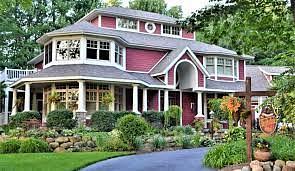Should You Buy a House Out in the Country?
Beautiful scenery, fresh air, no traffic, those are just a few of the things people living in the city often dream of when thinking about buying a home in the countryside. While it can be a dream come true, if you haven't prepared, it could end up being a nightmare instead. There's a lot to think about before pulling the trigger. Understanding the pros and cons of making that move, whether you're thinking about real estate for sale in Whistler or small-town Vermont, will help ensure you're making the right decision.
More House for the Money
Typically, properties in the countryside are more affordable than what you'll find in urban areas. Odds are, you could buy a four-bedroom home in a rural area for the same price you would pay for a one-bedroom condo in the city. With many people struggling to afford a home - nearly half of those surveyed in a 2020 NerdWallet poll stated that their low income was preventing them from buying, considering properties outside of the city could make the difference between being able to buy or remaining a renter.
Plus, if you find that perfect place, odds are you won't have to worry about having too much competition and getting into a bidding war. You might even be able to negotiate a better deal.
Fewer Restrictions
Compared to homes in big cities, there usually aren't as many restrictions on properties in rural areas. That means you'll probably have more options for extending your land for development, growing crops, adding outbuildings, or raising animals like cows, horses, sheep, goats, or any other type of livestock that might interest you. If you want to rescue abandoned dogs, for example, you can do it far easier away from the city, with many even placing restrictions on the number of canines you can have too.
No Noisy or Nosey Neighbors
In the city, you're probably just a few feet away or even closer to your neighbors, which can make it difficult to sleep or simply enjoy a tranquil space if they're noisy. Of course, neighbors can come with other problems, too, and when they're right next to you, it's even harder to avoid them. Rural living usually means peace and quiet, and while the community may be more close-knit, you probably won't have to worry about a nosey neighbor peeking over your fence.
Utilities, Internet, and Cell Service
One of the biggest downsides to living in the country is access to fast Wi-Fi and cell phone service. Both may be much more limited than you're used to, so it's important to look into the options before buying. In the city, you're unlikely to have to worry about basic utilities like electricity and water as they're taken care of by that municipality, but in rural areas, electricity may be supplied by a small, local company, and outages may be more frequent. Having a back-up such as a wood-burning stove and a generator is usually a good idea. Water might come from a private well, so you'll want to have a quality check conducted, while sewage is frequently taken care of via a septic tank, which requires monitoring and maintenance.
More Costly Maintenance and Repairs
Owning a piece of land requires maintenance, and if you buy an older home, which is often the case when purchasing in the country, the cost of maintenance and repairs is going to be much higher than that new home in the city. If you have a wood-burning stove, that means buying firewood or chopping your own. There's almost always something that needs to be taken care of on a rural property, which some people enjoy, while others loathe it.
Comments
There are 0 comments on this post





